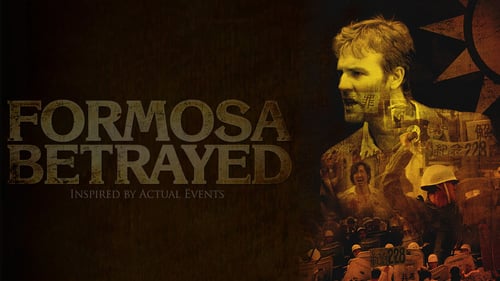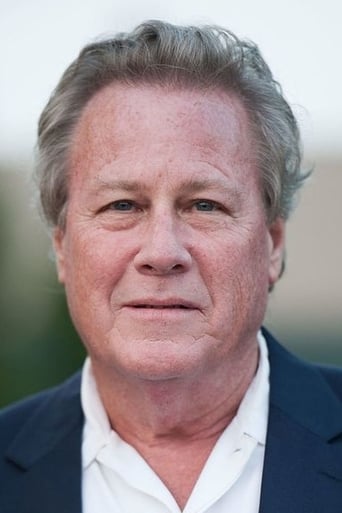Phonearl
Good start, but then it gets ruined
BroadcastChic
Excellent, a Must See
Whitech
It is not only a funny movie, but it allows a great amount of joy for anyone who watches it.
Ella-May O'Brien
Each character in this movie — down to the smallest one — is an individual rather than a type, prone to spontaneous changes of mood and sometimes amusing outbursts of pettiness or ill humor.
Robert J. Maxwell
The political framework on which the story hangs is evidently drawn from historical incidents, but the story sucks. The film is a sort of true-crime docudrama of the sort that shows up on TV from time to time. It can't make up its mind whether it wants to be more docu or more drama, and the result is a pretty choppy piece of work.A renowned Chinese professor is assassinated in Chicago and the FBI investigation leads one agent (Van Der Beek) to Taiwan, formerly Formosa, homeland of the now dead scholar. The authorities greet him, promise him observer status, but make it clear he will not carry out any independent investigation. Then they quickly try to shuffle him aside with restaurants and parties. "Enjoy the many pleasures of Taipei." The rest of the film demonstrates that the government of Taiwan is thoroughly corrupt, murderous, lying, greedy, and given to exploitation of the United States. Since the events described are true, or close to it, I'm sympathetic to the native Taiwanese' desire for independence, but the movie is so clumsily written and edited that I was never really sure who they wanted independence from. From the mainland Chinese? They're already independent of the PRC. From the residue of the government of Chiang Kai Shek? That makes more sense. Chiang lost the war against the Chinese communists led by Mao Tse Tung in 1947 and moved what was left of his army to Taiwan, where he became a ruthless dictator. It was like some third world country in Latin America. He was roundly hated by the Taiwanese whom he hadn't yet exterminated. No reason to doubt that, according to some anthropologists I know who did field work on Taiwan during the early 60s. We supported him not because he was the model of a democratic leader but because he wasn't a communist. During the Korean War, General Douglas MacArthur wanted to "unleash" Chiang Kai Shek and let him invade the mainland, which was pretty funny, even at the time.But back to the movie. There are so many threads involved that it's awfully confusing. Van Der Beek's principal contact in Taipei is an embassy official, a woman who is somehow involved in secret deals to buy arms from Nicaragua. The guy who assassinated the professor tries to assassinate Van Der Beek but then changes his mind, decides to testify for the independence movement, and is himself assassinated by parties unknown but probably impolite.I didn't like the acting. Will Tiao as Ming is okay, sympatico in appearance and demeanor. Mintita Wattanakul, a Thai actress, is almost edible. But the audience proxy is poor James Van Der Beek. He cannot act. He lends the movie's center a ligneous presence, a la David Duchovny in "The X Files", which might pass for being cool. But one or two scenes call for outrage and he can't handle it.The direction by Adam Kane is very fashionable and it's terrible. The palette is ghoul green. The camera never stops moving. That's okay for the inevitable chase through an open Chinese market but not for a medium two shot of people trading lines. There are gigantic close ups, for the sight challenged. Van Der Beek is young, handsome, outfitted in tailored suits, his hair perfectly styled and dry blown, and he wears an a la mode day's growth of beard whose density and length don't vary -- no matter if he's spent the night in jail or in a ritzy hotel room. You know, your typical FBI agent who looks exactly like a Hollywood movie star? It's a dumb movie about how bad Chiang's government was, rather in the same way that Richard Gere's "Red Corner" was a dumb piece of anti-Chinese propaganda. (Gere likes Tibet.) It's not impossible to make decent movies about intrigues in exotic lands. "The Killing Fields" managed it, though it was more drama than docu. "The Year of Living Dangerously" gave us another glimpse of how it can be carried off and so, in its own abominable way, did "Casablanca." "The Sorrow and The Pity" was straight docu. It CAN be done, but "Formosa Betrayed" just throws too much information at the viewer, as if anxious to win our sympathy quickly and completely, and in doing so it alienates us. Or me, anyway.
Bo H
Its not hard to understand why some people took the movie as offensive. Although not a documentary, the movie has events that actually occurred in Taiwan's recent history. Those brought up under KMT's propaganda can't believe such capable government can do such nasty things behind people's back. :DThere are so basic facts about the movie.1. Not a documentary: Inspired by actual events, but not actual events. 2. For non-Taiwanese audiences: Or those not-familiar with Taiwan and her background. This "Free China" was backed by the US to fight communists but at the expense of severely restricting human rights in Taiwan. 3. Not actual scenes: Unfortunately, due to funding and the political situation in Taiwan, the set needs to be filmed elsewhere than Taiwan.This movie is a must-see for those who wants to know more about Taiwan and even for those who knows nothing about Taiwan and wants to know the island that makes everything in the 70s and 80s. People who calls it a propaganda is probably afraid of viewers will become interested and search for more info on the background of Taiwan, especially those times under the rule of KMT. Human rights and justice are universal common values, however, the Taiwanese people was not able to enjoy such.
Suestonto
Never have I seen a propaganda film release to the public like its a Hollywood film. I repeat, it's a propaganda film. Nothing in the film is base on true history.There's a group of radical Taiwanese who wants the independence of Taiwan. It's a very minor group. The best comparison in American history is the people of modern South who still believed in Confederacy.This radical group of Taiwanese wants international attention, so it decided to package a propaganda film into a Hollywood dramatized product.It cannot find any Taiwanese who take its idea seriously, so the people of the Pro TI group decided to go to Thailand to hire a bunch of cheap labors to do its deed. The Thai people don't care about Taiwanese politic, so some demonstration scenes contain many paid Thai lethargically raising their hands on a topic they have no interest.There's many dialogs about Taiwanese that's absolutely misleading. I repeat, it's propaganda film, so it doesn't surprise anyone. One of the actors claimed Taiwanese was speaking their native language "Taiwanese", and NOT Chinese. It's not true. These Taiwanese were speaking "Min Nan", which is the language derives from Fujian, a province of China.There's also an over emphasis of the 228 incident. The people who were killed were highly educated rich folks and land owners. Normal Taiwanese at that time didn't have free time to demonstrate politically. Of course the decedents of the rich folks decided it was bad for them in Taiwan. That's why they abandoned Taiwan and immigrated to US. You have to be ultra rich guy to be able to travel abroad back then. I believe the producer is one of the decedents. Of course, no real normal people care about this 228 stuff.Finally, Henry Wen (Liu in real life)in the film was murdered because he was a triple agent (PRC, Taiwan and FBI).
michael@piston.net
It is wonderful to see a film about the heroic struggle of the people of Taiwan for democracy and independence, even if I and my wife were the only people in theater at a 7:20 p.m. Saturday showing on the day of its release in Michigan. Unfortunately, the best thing I can say for it is that the backstory is basically true - there was a Taiwanese-American murdered in the U.S. by a Taiwanese gang, apparently at the instigation of Republic of China's government, possibly because he had embarrassed it by writing an unflattering biography of then R.O.C. President Chiang Ching-Kuo, and the atrocities portrayed in the film did largely happen, albeit at different times and under different circumstances. The film systematically garbles and almost trivializes a series of horrible crimes against the Taiwanese which actually occurred over a period of years by making virtually every crime of the late KMT period seem to occur within the same week as part of an effort to stymie an FBI investigation of the murder. Equally annoying was the gross parody of how actual criminal investigations in foreign countries are conducted. U.S. criminal investigators abroad always at least appear to cooperate (and show respect for) their foreign counterparts even when they suspect, as is often the case, that they are less than enthusiastic about the investigation. No FBI agent is going to charge into a foreign government's takedown of a suspect, and fight his way past a army of armed soldiers to try to get to the perpetrator first. The agent's other activities in the film are equally preposterous, going way beyond "cowboyish" to simply suicidal, both for himself and his informants. In short, the film provides a very garbled overview of recent Taiwanese history combined with the most absurd portrayal of a U.S. overseas criminal investigation since Rush Hour.





